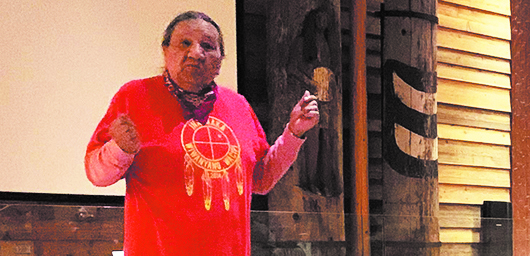
By Shaelyn Hood, Tulalip News
Decades after the catastrophic existence of residential boarding schools, tribal communities continue to mourn and feel the trauma from their elders’ past. There are few remaining tribal elders who lived through this period, and even fewer who feel comfortable enough to tell their stories. Matthew War Bonnet (Lakota) is one elder who has been on the frontlines at community events, sharing his eight-year experience of being in a boarding school, and demanding apologies from the churches involved.
On Saturday, April 30, Tulalip community members gathered at the Hibulb Cultural Center to hear Matthew tell his story.
Matthew shared that he was around 11 years old when he was first taken from his home and forced into a boarding school in Michigan. These schools were meant to hold Native children up through the 12th grade, force European colonization, and deplete all tribal culture. He spoke of going away nine months at a time, living far from his family, to schools where he could no longer speak his language, no longer sing or drum, or carry out any actions that reflected his culture. Now required to follow a new religion, and partake in confessionals, he was often threatened if he didn’t have anything to repent for.
The amount of abuse that he and his classmates endured was astronomical and dehumanizing. He remembered being stripped of their clothes at a moment’s notice, being slashed with razor straps and struck with cattle-like prods. And often, his classmate’s ears were cut off.
Not long after his departure from the school, Matthew talked about seeing the toll that it was taking on the survivors. Years of torture led to lifelong scars not only on their bodies, but on their memories and hearts as well. Matthew shared how the people that survived boarding schools never truly walked away from it all. He spoke of the all-consuming anger that the survivors felt, never feeling any sense of peace. Many turned to drugs and alcohol and sometimes suicide to cope with the torment of their past. Some would even take their anger out on their families and children.
But, sympathizing with what they have been through, Matthew said, “it’s not fair to blame them, with not understanding what they’ve been through. What can you say that will actually help take away their anger?”
Many people in the Tulalip community speak of generational trauma. It is the concept that a shared communal trauma can be passed down from one generation to the next. This can ultimately can lead to generations of mistrust, sensitive fight or flight responses, depression, low self-esteem, and more. Generational trauma can quickly take over a community, and devour people’s abilities to heal.
When asked if he has spoken to other survivors in the area, and what similarities they might have with him, Matthew explained, “I never want to speak for anyone else’s experience. All I can do is make myself available to people, and tell my own story.”
Matthew’s son spoke about how he didn’t quite understand what his father had gone through, “as a kid growing up, I noticed my aunts and uncles didn’t trust my teachers at our school, and white people in general. For a long time, I didn’t understand it. But they (the survivors) were truly broken as children. I look at my son today and can’t imagine not being in control and being able to protect him.”
With the recent discoveries of Indigenous remains from the works of boarding schools, tribal communities are coming together and finding strength in conversation. As well as that, the voices of our people have begun to force the churches’ recognition for their doings.
“The church needs to acknowledge what they’ve done. These survivors of mission schools are suffering every day, and apologies don’t cut it. They should be making attempts to make things right, and help find the bodies of our people”, Matthew said.
It is the duty of our people to protect our elders, and create a better future for the generations after us. The more discussions had around residential boarding schools will only further heal tribal communities. Uniting together, and creating a safe shared space for Native Americans to discuss our dark past, and ultimately how we can move forward together. Generational trauma can stop with us.